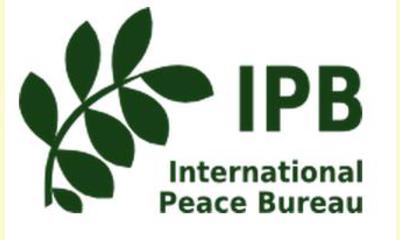|
|
IPB online course: Disarmament for Development
an article by Alicia Cabezudo, Co - Vice President, International Peace Bureau - Geneva
Dear colleagues and Alumni, Please help us to
disseminate this information on the new on line
Course sponsored by the International Peace Bureau
- IPB Geneva titled Disarmament for Development.
We believe that today - more than ever - Military
budget have to be reduced and funds transferred to
Development.

click on photo to enlarge
Course description: Disarmament for Development,
organised by the Open
University of Catalonia (UOC) in partnership
with the International Peace
Bureau (IPB). The world spends over $1.7
trillion each year on the military. Even a
fraction of this sum could go a long way in
tackling mass poverty and mitigation and
adaptation to climate change. Meanwhile weapons of
all kinds undermine development and do
unacceptable harm to civilians. How can we work to
change this situation? In order to achieve more
just and peaceful societies, which is the dream of
most people and the mission of the UN, it is
important to look seriously at some of the major
hampering factors. This course deals in particular
with the excessive military spending and the
misuse of resources that should have been used to
meet people's basic needs and interests.
It addresses the need to change attitudes and
rethink unsustainable and destructive production
and consumption patterns. The Disarmament for
Development perspective is presented within the
broader context of global efforts to create a
Culture of Peace. IPB's and UOC's Disarmament for
Development program focuses on a set of issues
often overlooked by those working on poverty or
peacemaking. This course offers an introduction
both to the issues and to ways of campaigning.
The Disarmament for Development program is intended
to enable students:
·To gain theoretical perspectives on a multi-
disciplinary topic of considerable scope.
·To access information and knowledge relevant to the
theme and to the politics and economics surrounding
the military choices that impact development.
·To acquire skills of analysis and practical
planning of actions to impact decision makers.
·To develop techniques and strategies for building
campaigns, projects and interventions in the
political arena. ·To learn ways to inspire, to
lead and to facilitate the participation of others
in programs in this field. To develop new ways to
communicate with a variety of interlocutors:
governments, civil society actors, academics,
media, the general public.
The announcement is in 3 languages (but note the
course is in English only): English;
Spanish;
Catalan.
Dates: October 1st 2014 - February 15, 2015
Credits: 6 credits (150 h)
Cost and Registration and Enrolment fees: 300
euros
For more information write to:
secretariacp@uoc.edu, mailbox@ipb.org
|








|
DISCUSSION
Question(s) related to this article:
Does military spending lead to economic decline and collapse?,
* * * * *
Latest reader comment:
I think it was Marx who said that military spending is like throwing money into the sea, since it does not produce anything of value for people.
We could saw this previously in the case of the Soviet Union that was driven into bankruptcy by the arms race, which was a deliberate and successful strategy of NATO.
But now, if we look clearly, we can see it is now the case for the United States which produces very little for export and imports enormously (especially from China), while it spends most of its wealth on arms production.
Arms production is hidden in the official government budget of the United States. First, the government adds in social security which does not come from taxes, but which is simply a form of saving by those who pay into the system. Then it hides much of military spending in other budgets (for example nuclear production is hidden under energy). And finally, it fails to mention that most of the enormous budget item of debt payment is actually the payment for previous wars and arms production.
According to the careful research of the War Resisters League (available at their website, almost half of the federal budget of the United States is for present and past military expenses. This amounts to over 1.3 trillion dollars a year!

|
|









